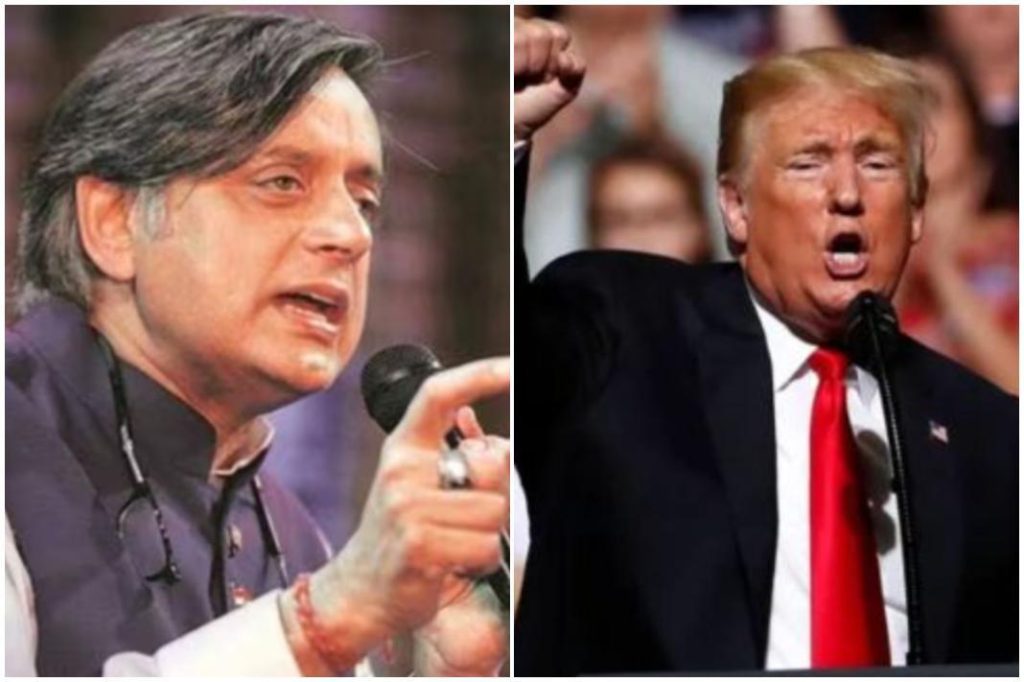
Shashi Tharoor shares 4 reasons why Trump’s ceasefire post on India & Pak was ‘disappointing’
In a recent Twitter post, US President Donald Trump called for a ceasefire between India and Pakistan, sparking a heated debate on social media and among political circles. Congress MP Shashi Tharoor was one of the prominent voices that expressed disappointment with Trump’s post, citing four reasons that justify his stance. In this blog post, we will delve into Tharoor’s reasons and analyze the implications of Trump’s ceasefire call on the ongoing tensions between India and Pakistan.
Tharoor took to Twitter to express his disappointment, saying that Trump’s post was “disappointing” and that it was based on a “false equivalence” between the victim and the perpetrator. He argued that Pakistan’s actions in supporting cross-border terrorism and its role in the Kashmir dispute cannot be equated with India’s response to these provocations.
Firstly, Tharoor pointed out that Pakistan has not earned the right to be part of any negotiating framework on the Kashmir dispute. He argued that Pakistan’s actions, including its support for terrorism and its role in fomenting unrest in Kashmir, have not been in good faith. Therefore, it is unjust to offer Pakistan a seat at the negotiating table, especially when it has not demonstrated a willingness to address India’s concerns.
Secondly, Tharoor claimed that Trump’s ceasefire call “internationalises” the Kashmir dispute, which is a bilateral issue between India and Pakistan. He argued that this could potentially undermine India’s sovereignty and territorial integrity, as well as create a precedent for other countries to intervene in India’s internal affairs.
Thirdly, Tharoor said that Trump’s post “re-hyphenates” India and Pakistan, implying that the two countries are still tied together by a bilateral relationship that needs to be nurtured. However, Tharoor argued that the Kashmir dispute has made it clear that India and Pakistan are not equals, and that Pakistan’s actions have created a situation where India needs to be cautious in its dealings with the country.
Lastly, Tharoor expressed concern that Trump’s ceasefire call may embolden Pakistan to continue its support for terrorism and its role in the Kashmir dispute. He argued that Pakistan needs to be held accountable for its actions, and that any ceasefire or negotiating framework must be based on a clear understanding of Pakistan’s responsibilities and obligations.
Tharoor’s criticisms of Trump’s ceasefire call are not without merit. Pakistan has a long history of supporting terrorism and fomenting unrest in Kashmir, and its actions have created a situation of extreme tension and violence in the region. India has been justified in responding to these provocations, and it is unfair to equate India’s response with Pakistan’s actions.
Furthermore, Tharoor’s points about the internationalisation of the Kashmir dispute and the need to re-evaluate the India-Pakistan relationship are crucial. The Kashmir dispute is a bilateral issue that needs to be resolved through dialogue and negotiations between India and Pakistan. Internationalising the dispute could potentially undermine India’s sovereignty and territorial integrity, and create a precedent for other countries to intervene in India’s internal affairs.
In conclusion, Shashi Tharoor’s criticisms of Trump’s ceasefire call are based on a clear understanding of the complexities of the Kashmir dispute and the need to hold Pakistan accountable for its actions. Trump’s post may have been well-intentioned, but it was misguided and potentially damaging. India needs to be cautious in its dealings with Pakistan and ensure that any ceasefire or negotiating framework is based on a clear understanding of Pakistan’s responsibilities and obligations.
Source: https://x.com/shashitharoor/status/1921962732972302677






